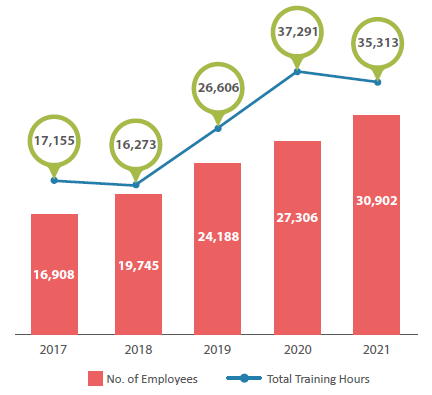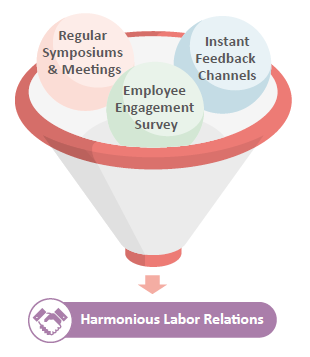
Inclusive Workplace
Human Rights
USI supports, respects, and is committed to human rights as defined in Principles 1 and 2 in the United Nations (UN) Global Compact, the Universal Declaration of Human Rights, the UN Guiding Principles on Business and Human Rights, the International Labor Organization’s Declaration of Fundamental Principles and Rights at Work, the USI Code of Business Conduct and Ethics and the laws of the countries in which we operate. Being a member of the Responsible Business Alliance, we adopt its Code of Conduct in our global operations to enforce our commitment to protecting human rights.
Our commitment to enforcing human rights protection through these principles:
- Diversity and Anti-discrimination: We respect the diversity of our employees, suppliers, business partners, communities and all other stakeholders. We strictly prohibit any discrimination based on ethnicity, color, gender, gender identity, sexual orientation, marital status, language, age, nationality, religion, political affiliation, citizenship, ancestry, physical or mental disability, pregnancy, illness or any other characteristics protected by law.
- Respect and Humane Treatment: We are committed to treating people with respect and humanity. It is not tolerated to have any form of disrespectful or inappropriate behaviors in the workplace and work-related environment, including but not limited to sexual harassment, maltreatment, corporal punishment, mockery, insult, discrimination, hatred, derogation, threats, hostile behavior, interference, tracking, mental coercion, and aggression, etc.
- No Forced Labor and Human Trafficking: Being an employer and a global corporate citizen, we firmly forbid any type of forced labor, including human trafficking and illegal employment, and ensure all employment to be built upon the willingness, that means all employees have the right to choose or terminate the employment with the reasonable notice period in compliance with local laws.
- Child Labor and Young Workers: Any form of child labor is strictly prohibited. And there is no tolerance to employ the young workers aged 18 or below to perform any work that could jeopardize their health and safety, including night shifts and overtime.
- Compensation, Benefits and Working Hours: All relevant laws and regulations on salary, social security, working hours, etc. of the country or the jurisdiction where our operations are located are compliance with.
- Safety and Health in the Workplace: We are committed to providing our employees a safe and healthy work environment and striving for with zero injuries and accidents through complying with all applicable health and safety regulations and ensuring all procedures right in place.
- Freedom of Speech and Association: It is fully respected and supported that all employees have the right to freely associate and express their points of view. We are dedicated to build a trust and positive environment where employees can share their concerns or suggestions without fear of interference, intimidation, reprisal, discrimination, or harassment.
- Protection of Privacy:We recognize privacy, as a fundamental human right, shall be protected. Complying with USI Privacy Policy, we strive for safeguarding personal data privacy and data security.
- Product Responsibility and Conflict-Free Minerals Commitment: We recognize the corporate responsibility for the products covers the entire life cycle from the raw materials used to their use and subsequent cycling. Keeping with USI conflict-free mineral procurement commitments, no metal or product from conflict minerals or areas that violate human rights is purchased or used on USI manufacturing and production. It is also not tolerated that USI products will be used for human rights violation.
Due Diligence Process
USI understands and manages human rights issues in a responsible manner, adheres to the PDCA process and the concept of continuous improvement, and sets up a special unit of the Sustainability Committee to identify, evaluate, prevent, and reduce human rights-related impact.
RBA Risk Assessment Framework
- USI Manages human right risk through the RBA management mechanism. Every year we use Self-Assessment Questionnaire (SAQ) and entrust a third-party agency that has received special training in social and environmental audits to simultaneously implement RBA Validated Audit Process (VAP) to do the risk management for our business or new business relationship companies to conduct risk management, and the regular risk assessments are carried out using a risk matrix, which has two quantifiable indicators of frequency and impact. Investigate the results of human rights risk assessment in the past two years, identify issues and objects that are vulnerable to human rights risks, formulate measures, make implementation plans, and continue to make improvement. The annual assessment results would be submitted to each team of the Sustainability Committee and reported to top management team in the regular meeting.
- For joint venture human right risk assessment, we require joint ventures to conduct human rights risk assessment annually. In their sustainability reports, we also require them to disclose their SAQ results, prepare corresponding improvement plans, and follow up on mitigation and remediation measures statuses.
- For supplier human right risk assessment, we conduct a sustainable risk assessment for the annual first-tier suppliers and further identify their human rights risks through on-site audits and RBA VAP. From this, we then identified potential high-risk suppliers and continuously track the improvement effect of different risk conditions.
RBA Human Rights Management Mechanism
- In accordance with the RBA management framework, each facility implements internal and external audits regularly, and arranges cross-site mutual audits every year to ensure full compliance with the regulations. If there are any violations, an improvement plan would be proposed and improved within a requested time period. The Sustainability Committee meets quarterly to review the achievement and improvement of various performance indicators of labor, ethics, environment, safety and health to ensure that the company fulfills various social responsibilities. The company has established investigation mechanisms and complaint channels to ensure the implementation of human rights policies and avoid incidents that endanger human rights. USI has also established employee reporting mechanisms to handle employees' complaint.
Human Rights Risk Mitigation & Remediation
In 2021, all facilities got SAQ assessment scores that are higher than 85, indicating that all facilities in the assessment of human rights risks are low-risk facilities. Combining RBA VAP assessment with employee complaint cases, we formulate annual mitigation and compensatory measures for the issues that are easily exposed to risks, such as “working hours, non-discrimination, sexual harassment, privacy rights, emergency preparedness and occupational safety” to improve them through human rights training to enhance employee's awareness of human rights, review the working hours early warning system mechanism again to strengthen working hour management, recruit a sufficient manpower to cope with the impact of productional manpower arrangements caused by both the USI business expansion and the supply chain material shortages due to COVID-19, and identify the hazards of the operating environment and manage the negative impacts of risk opportunities.
USI continuously pays attention to human rights protection issues, promotes relevant trainings, and enhances human rights protection awareness to reduce the possibility of related risks. In 2021, the per capita human rights-related training hours is 1.1 hours; the total training hours is 35,313 hours; the total number of employees who are trained reaches 30,902 (the resigned employees are included). As a result, 100% of current employees have completed training on human rights issues.
Human Rights Training Number of Attendees and Training Hours:

USI human rights policies are implemented as follows:
Employee Rights: Build a workplace that is diverse and inclusive, free from discrimination and harassment, and has equal job opportunities
- Comply with the labor regulations in the country or jurisdiction where the facility is located, and sign employment contracts with all employees in compliance with local regulations (the signing rate is 100%). The contract clearly stipulates the rights and obligations of both parties (employee and employer) to protect the rights and interests of both parties. All facilities have formulated employee work rules to ensure that employees are aware of their relevant rights and obligations.
- Each facility has Recruitment Guidelines to define standardized operating procedures to select the most suitable candidates who are willing to serve in USI without discrimination and difference, to attract more diverse talents for the company.
- The purpose of “Measures for Humane Treatment” is to show a workplace culture of safety, dignity, non-discrimination, mutual respect and tolerance, and equal opportunities, and to protect all employees from physical or mental harm while employees conduct their jobs.
Employee union: Respect the freedom of association and assembly of employees
- Employees can independently form associations, organize and participate in trade unions and conduct collective consultations. The company does not interfere with the establishment, operation or management of its trade unions, maintains smooth communication channels with trade unions, implements relevant matters in group agreements, and develops stable and harmonious labor relations. The Company will maintain a smooth communication channel with the trade union, implement the relevant matters of the group agreement to develop a stable and harmonious labor relationship. Now, Zhangjiang Facility, Kunshan Facility and Mexico Facility have established trade unions, and a group agreement is signed with the trade union. Employees participating in the trade union enjoy the protection of the group agreement. The group agreement coverage rate is around 63%. In 2021, with the Company’s proactive communication with employees, there were no major labor disputes or work stoppages caused by strikes.
| Unit | 2017 | 2018 | 2019 | 2020 | 2021 | |
|---|---|---|---|---|---|---|
| No. of Employees in Unions | No. of employees | 2,257 | 4,363 | 4,435 | 5,900 | 6,350 |
| Join Rate | % | 13.7 | 23.5 | 24.0 | 31.7 | 32.9 |
Employee communication: Establish a positive and harmonious labor-management relationship
- USI actively builds positive employee relations, and continue to build an open, trusting and smooth two-way communication environment. We regularly hold supervisors' symposiums and listen to employees’ voices through meetings, channels, questionnaires in the form of instant feedback, and take practical actions to promote the harmony of labor-management relations. Due to COVID-19 in 2021, based on the local government’s regulations to limit the number of gatherings and the consideration of employee health risk control, the method of face-to-face communication with employees has dropped sharply. The company still holds 116 employee communication seminars (46 General Manager Seminars, 22 Care Conferences for New Employees; 18 Care Conferences for Foreign Employees; 30 Employee Feedback Conferences) and deliveries messages to employees by producing a variety of different ways to strongly broadcast communication messages. Besides, Staff responded that a total of 702 cases were closed, and the corresponding practices and results were communicated to all employees. The case closure rate in 2021 is 100%.



